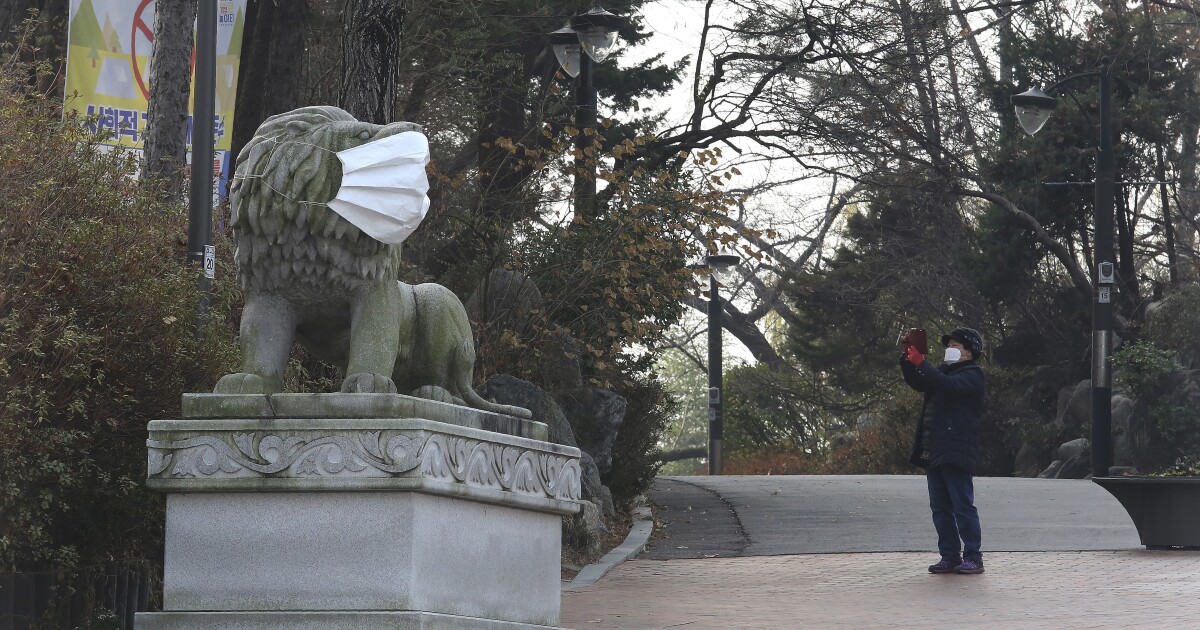SEOUL, South Korea (AP) – South Korea reported 950 new cases of coronavirus on Saturday, its biggest daily increase since the start of the pandemic, as fears mount of saturation of hospitals in the capital’s metropolitan area. Seoul
The data revealed by the Agency for Disease Control and Prevention raised the national total to 41,736 infected, after the health authorities added more than 8,900 patients in the last 15 days. Additionally, six people have died from COVID-19 in the past 24 hours, bringing the total to 578, it added.
Of the new cases, about 680 were registered in the vicinity of Seoul, an area with a high population density where the authorities have problems tracking infections, which arise everywhere, from hospitals or centers to restaurants, saunas, schools and army units.
Infections were also confirmed in other large urban centers, including Busan, Gwangju, Daejeon, Ulsan and Daegu, a city in the southeast of the country that was the epicenter of the first wave in spring.
The government had lowered restrictions to their lowest level in October even though experts warned of the virus rebounding with the arrival of the cold, when people spend more time indoors. Some of the measures have been reimposed in recent weeks, such as closing nightlife clubs or allowing restaurants to only make deliveries or home orders after 9:00 p.m.
Prime Minister Chung Sye-kyun said the country may have to tighten restrictions to their highest level, which includes banning gatherings of more than 10 people, closing schools, suspending professional sports competitions and demanding companies that most of your employees work from home.
In a Facebook message, President Moon Jae-in apologized for his government’s inability to stem the outbreak after months of measures that damaged the economy. The leader asked the population to be vigilant and pointed out that they are going through their “last crisis before the arrival of vaccines and treatment.”
Health authorities are also trying to increase the number of screening tests and to prevent asymptomatic or mildly ill people from spreading COVID-19. Starting Monday, rapid antigen tests carried out in the emergency room, in intensive care units and in remote hospitals will be covered by Social Security. The tests would cost about 8,000 won ($ 7) each.
For its part, Tokyo reported 621 new cases on Saturday, a new record for the Japanese capital, where the lack of government measures raised fears of a new rebound during the Christmas season. In total, the country has registered 174,000 cases with 2,500 deaths.
Experts from a coronavirus task force in the Tokyo metropolitan area said severe cases are increasing, putting pressure on hospitals and forcing many of them to stop treating other patients.
The task force on Friday called on the government to take more restrictive measures to reduce social and economic activity, such as suspending travel outside the city and reducing business hours in areas where infections are rising. The latest data shows that current measures have not been effective and the situation could worsen during the year-end holidays.
Additionally, eight primarily Western nations accused North Korea of using the pandemic “to continue cracking down on the human rights of its own population,” pointing to reports of an increase in coronavirus-related executions and written controls of movement in and around its capital, Pyongyang.
The statement was read virtually on Friday after a closed-door meeting of the United Nations Security Council in which the human rights situation in the secretive nation was addressed.
Seven council members – Germany, Belgium, the Dominican Republic, Estonia, France, the United Kingdom and the United States – in addition to Japan, said North Korea was putting nuclear and military power above its citizens.
The government’s decision “to prioritize its weapons programs over the needs of its people and its isolation from the international community are inevitably worsening the impact of the pandemic on the North Korean population,” the statement said.
North Korea sealed its border with China, its biggest trading partner and benefactor, at the start of the pandemic in January. The Kim Jong Un government maintains that it has not detected any cases of COVID-19 in its territory, a claim disputed by foreign experts.
–

